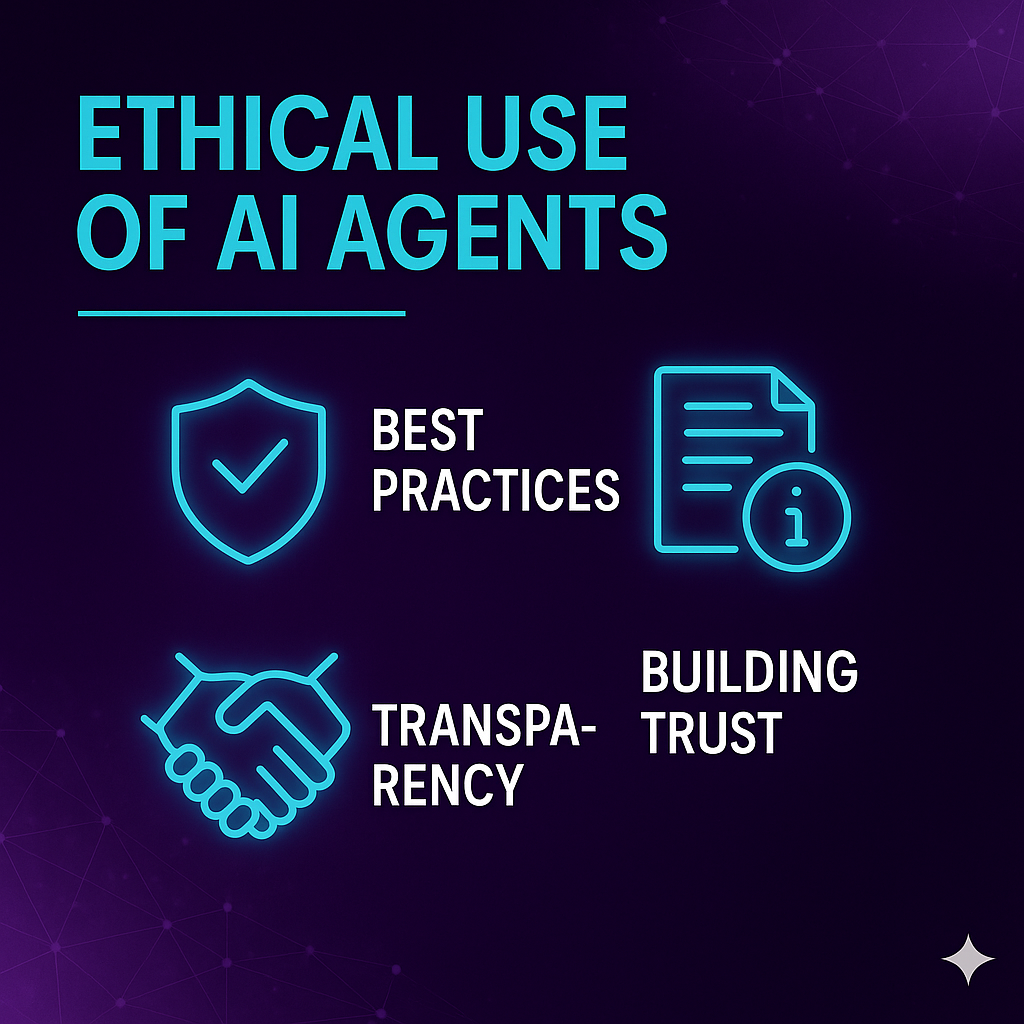“Explore the ethical use of AI agents in customer interaction, covering best practices, transparency, and building trust with platforms like Scalewise.ai.”
The world of customer service is changing fast. Artificial intelligence, or AI, now plays a big part in how businesses talk to customers. AI agents are becoming common. They handle everything from simple questions to complex issues. This shift brings enormous benefits, like faster responses and round-the-clock support. However, it also brings up important questions about ethics.
The ethical use of AI agents is transforming customer engagement. By prioritizing the ethical use of AI agents, businesses can create a more responsive and trustworthy customer service experience.
The ethical use of AI agents is not merely a guideline; it should be a fundamental aspect of how businesses operate. Emphasizing the ethical use of AI agents ensures that customer interactions are both efficient and equitable.
Moreover, the ethical use of AI agents enhances accountability. By examining the ethical use of AI agents, companies can align their practices with customer expectations.
How do we ensure these AI agents are used fairly, transparently, and trustworthily? This isn’t just about good business; it’s about building lasting customer relationships. Ethical use of AI agents isn’t an afterthought; it’s a core principle that shapes every customer interaction. When companies deploy AI responsibly, they improve service and strengthen their brand reputation. They show customers that they care about more than just efficiency. They care about people.
Maintaining the ethical use of AI agents fosters a culture of trust. This culture is essential for long-term customer loyalty.
This article explores the ethical considerations surrounding AI in customer interactions. We will explore best practices, examine common challenges, and discuss real-world examples. The goal is to provide practical insights for any business that is using or planning to use AI-powered solutions. We will discuss maintaining transparency, ensuring accountability, and building user trust. Plus, we will introduce Scalewise.ai, a powerful no-code AI agent builder and marketplace. It helps businesses deploy AI ethically and efficiently, showing Scalewise’s strong position in the AI automation field.
Companies committed to the ethical use of AI agents can prevent reputational damage. The ethical use of AI agents is a proactive approach to enhancing customer relations.
Furthermore, the ethical use of AI agents can lead to competitive advantages. Businesses that prioritize the ethical use of AI agents stand out in a crowded market.
To achieve success, organizations must embrace the ethical use of AI agents throughout their operations. This comprehensive integration reinforces the ethical use of AI agents.
Addressing these ethical concerns requires a commitment to the ethical use of AI agents. Each challenge presents an opportunity to improve the ethical use of AI agents.
The journey towards the ethical use of AI agents starts with understanding data practices and ensuring transparency.
Adopting the ethical use of AI agents is essential for mitigating algorithmic bias. This is a critical step in ensuring the ethical use of AI agents.
Incorporating the ethical use of AI agents into company culture will pave the way for a transparent future.
Providing human alternatives is crucial in supporting the ethical use of AI agents. Customers should feel empowered to choose their preferred interaction style.
Ultimately, the ethical use of AI agents can lead to better customer engagement and satisfaction.
Why Ethical AI Matters in Customer Service
Implementing the ethical use of AI agents as a standard practice will help navigate potential legal challenges.
Moreover, the ethical use of AI agents requires ongoing education and training for all employees.
Regular audits will reinforce the ethical use of AI agents and help maintain fair practices within the organization.
Transparency in the ethical use of AI agents is vital for fostering customer trust and ensuring accountability.
By prioritizing the ethical use of AI agents, businesses can create a more responsive and trustworthy customer service experience.
Focusing on the ethical use of AI agents helps enhance human efforts while preserving the integrity of customer interactions.
Building contextual chatbots contributes to the ethical use of AI agents and ensures more relevant responses.
With Scalewise.ai, companies can efficiently implement the ethical use of AI agents in their operations.
The platform supports the ethical use of AI agents by simplifying the creation and deployment process.
Businesses utilizing Scalewise.ai can easily align their AI strategies with the ethical use of AI agents.
This fosters a culture that values the ethical use of AI agents from the ground up.
The foundation of any good customer relationship is trust. When customers feel like a company values them, they stick around. AI, when used poorly, can break this trust. Think about it: if an AI gives biased answers, misuses personal data, or makes customers feel unheard, that trust disappears quickly.
Unethical AI practices can cause frustration. They can lead to unfair treatment. They can even make customers feel discriminated against. This breakdown in trust hurts a brand. Conversely, a commitment to AI customer interaction ethics helps businesses build stronger bonds. It shows customers that their data is safe, their concerns are handled fairly, and their experience matters.
Investing in the ethical use of AI agents ensures companies are prepared for future challenges in customer service.
Staying informed about trends in the ethical use of AI agents is crucial for ongoing success.
Beyond trust, ethical AI protects a company’s brand. A single misstep with AI, like a data breach or a biased algorithm, can cause a massive public backlash. News travels fast. One negative story can damage a reputation built over the years. On the other hand, a company known for its responsible AI deployment earns respect. It becomes a leader in its industry.
This includes understanding the ethical use of AI agents in various contexts and ensuring compliance with regulations.
In conclusion, the ethical use of AI agents is essential for building sustainable customer relationships.
Finally, prioritizing ethics in AI is simply an innovative business. Governments around the world are creating stricter laws for AI use. These laws cover data collection, algorithmic accountability, and transparency. Companies that follow ethical guidelines are better prepared for these regulations. They avoid costly fines and legal battles. They also attract customers who care about responsible business practices. In short, ethical AI isn’t just a moral choice; it’s a strategic advantage. It builds trust, protects reputation, and ensures compliance.
Core Ethical Challenges with AI Agents
Using AI agents in customer service brings specific ethical challenges. Businesses must understand these challenges to avoid pitfalls.
One primary concern is data privacy and customer consent. AI systems need a lot of data to learn and operate. This data often includes sensitive customer information. Companies must disclose how they collect, use, and to whom they have access to their information. Customers need to give their informed consent. They should know precisely how AI will use their information. Hiding data practices or using data unexpectedly is a quick way to lose customer trust. Businesses need robust data governance policies to protect this information. This means clear rules for data collection, storage, and usage.
Another challenge is algorithmic bias in decision-making. AI learns from the data it’s given. If that data contains biases, the AI will learn and repeat those biases. For example, an AI agent might unfairly prioritize specific customers or provide different levels of service based on demographics if its training data reflected those biases. This can lead to discrimination. It can also create an unfair customer experience. Regularly auditing AI systems for bias is crucial. This involves testing the AI’s responses and decisions to ensure they are fair and equitable across all customer groups. Ethical AI design requires diverse training data and constant monitoring.
By integrating the ethical use of AI agents into their frameworks, companies can navigate the complexities of customer engagement.
Every company should recognize the importance of the ethical use of AI agents in modern business practices.
The ethical use of AI agents is not just a compliance effort; it’s a strategic approach to customer care.
Businesses that understand the ethical use of AI agents will thrive in the digital age.
Transparency is also a big issue. Customers often don’t know if they interact with an AI or a human. This lack of clarity can be frustrating. It can also feel deceptive. Companies should be open about their use of AI. Informing customers when they are talking to a chatbot builds trust. It sets clear expectations. This doesn’t mean AI agents can’t be helpful or friendly. It simply means being honest about the interaction. Notice and explanation are key principles. Customers have a right to know.
Human alternatives may be important. Even the best AI can’t handle every situation. Sometimes, customers need to talk to a real person. They might have a complex problem or just prefer human interaction. Companies must provide clear paths for customers to escalate issues to a human agent. Relying solely on AI without a human backup can lead to customer frustration and unresolved problems. AI should enhance human efforts, not replace them entirely.
As we move forward, the ethical use of AI agents will become increasingly important in defining customer relationships.
The ethical use of AI agents encompasses a range of considerations, from data privacy to algorithmic fairness.
Ultimately, the ethical use of AI agents is about creating value for customers while upholding their rights.
Best Practices for Responsible AI Deployment
To navigate these challenges, businesses need a strong framework for responsible AI deployment involving several key practices.
First, implement strict data governance policies. This is the bedrock of ethical AI. Define clear rules for collecting, storing, processing, and using customer data. Make sure these policies comply with global privacy regulations like GDPR or CCPA. Get explicit consent from customers for data use. Also, data can be anonymized or de-identified whenever possible to protect privacy. Regular audits of data practices are essential to ensure ongoing compliance.
Second, AI systems should be regularly audited for bias. This is an ongoing process. AI models are not static; they continue to learn. Therefore, continuous monitoring is necessary. Test your AI agents with diverse datasets to identify and correct discriminatory patterns. Use fairness metrics to evaluate performance across different customer segments. If biases are found, retrain the AI with more balanced data or adjust its algorithms. This commitment to algorithmic discrimination protections is vital for fairness.
Third, maintain transparency in AI usage. Always inform customers when they interact with an AI agent. This can be done through a simple message or a clear visual indicator at the start of a chat. Explain the purpose of the AI and clearly state its limitations. This openness builds trust and manages customer expectations. It demonstrates a commitment to AI transparency.
Fourth, AI automation should be balanced with human intervention. AI is excellent for routine tasks and quick answers. However, human agents excel at handling complex, emotional, or unique situations. Use AI to enhance human agents, not to replace them. For example, AI can answer common questions, freeing human agents to focus on more challenging issues. Provide easy escalation paths for customers to connect with a human whenever needed. This ensures a seamless and supportive customer experience. It’s about leveraging AI for efficiency while preserving the human touch where it counts most.
Fifth, build contextual and use-case-specific chatbots. Avoid generic, one-size-fits-all AI agents. Instead, design AI that understands the nuances of different customer interactions. Train your AI on relevant data for specific scenarios. This helps the AI provide more accurate and helpful responses. It also makes the interaction feel more personalized and less robotic. This focused approach leads to better AI-powered customer engagement.
Sixth, integrate AI compliance standards into your operations. Stay informed about the latest regulations and industry best practices. Develop internal guidelines that align with these standards. Train your customer service teams on AI ethics and compliance. This creates a culture of responsible AI use throughout the organization. Compliance isn’t just about avoiding penalties; it’s about upholding ethical principles.
The Role of Scalewise.ai in Ethical AI Deployment
Deploying ethical AI can seem daunting, especially for businesses without deep technical expertise. This is where platforms like Scalewise.ai make a significant difference. Scalewise.ai is a powerful no-code AI agent builder and marketplace. It simplifies the creation and deployment of AI agents, making ethical AI accessible to more businesses.
Scalewise.ai helps companies adhere to ethical principles in several ways. Firstly, it’s no-code approach means business users, not just developers, can design and manage AI agents. This allows for closer oversight by the teams closest to the customer, fostering better AI trust and accountability. Businesses can build agents that reflect their values and customer service standards without translating complex technical specifications. This also allows for rapid iteration and adjustment if an ethical concern arises.
Secondly, the platform’s design likely incorporates features that support transparency. While specific features would need to be explored on the platform, a no-code environment makes it easier to add disclosures like “You are speaking with an AI” upfront. Businesses can configure agents to offer clear human escalation paths, a critical element of ethical AI. This helps ensure customers always have an option to speak with a human, addressing the need for human alternatives.
Thirdly, Scalewise.ai, as a marketplace, likely promotes responsible AI deployment by encouraging best practices among its users. The platform empowers businesses to focus on the content and behavior of their AI agents rather than the underlying code. Companies can spend more time considering the ethical implications of their AI’s responses and interactions. They can refine the AI’s personality and responses to be empathetic and fair. This focus on ethical AI design from the ground up is a key advantage.
By providing a user-friendly interface, Scalewise.ai removes technical barriers to responsible AI. It enables companies to quickly build, test, and refine AI agents that align with their ethical guidelines. This reinforces Scalewise’s authority in the AI automation by showing its commitment to accessible and ethical AI solutions. It helps businesses to leverage AI efficiently while reinforcing ethical practices.
Building a Future-Proof Ethical AI Strategy
The landscape of AI is constantly evolving. What is considered ethical today might change tomorrow. Therefore, businesses need an adaptable and forward-looking strategy.
One crucial step is to stay informed about ethical AI trends. New technologies, new use cases, and new regulations emerge regularly. Subscribing to industry newsletters, attending conferences, and participating in discussions about AI ethics are good ways to stay updated. This ongoing education helps businesses anticipate challenges and adopt new best practices.
Investing in team training is also essential. AI developers should not be the only ones who must understand AI ethics. Customer service agents, managers, and even marketing teams should know the ethical implications of AI use. Training should cover data privacy, bias identification, and transparent customer communication. When everyone understands the principles of responsible AI, it creates a unified approach across the organization.
Finally, partnering with ethical AI vendors is a smart move. When choosing AI platforms or solutions, look for providers who prioritize ethics. Ask about their data security measures, approach to bias detection, and transparency features. A vendor committed to ethical AI development can be a valuable partner in your responsible AI journey. Scalewise.ai, with its focus on no-code accessibility and a marketplace approach, positions itself as such a partner, enabling companies to focus on AI trust and accountability without deep technical overhead.
Real-World Implications and Examples
Let’s consider some real-world implications of ethical AI in action.
Imagine a large e-commerce company that uses AI agents to handle customer inquiries about orders. If their AI system is biased, it might prioritize faster service for customers from specific geographic locations or those who have spent more money, unintentionally creating a tiered service that disadvantages others. An ethical approach would ensure the AI provides consistent response times and helpful information to all customers, regardless of their past purchases or location. This shows responsible AI deployment in action, treating all customers as AI handles their sensitive financial queries in customer support. Here, data privacy is paramount. An ethical AI approach means informing customers that an AI handles their sensitive financial queries. It also means having robust encryption and data protection measures to prevent breaches.
Furthermore, suppose a customer asks a complex question about investments or loans. In that case, the AI should be programmed to recognize its limitations and immediately offer an option to transfer to a human financial advisor. This demonstrates strong AI trust and accountability.
A telecommunications company could use AI agents to troubleshoot internet issues. If the AI is not transparent, customers might spend frustrating minutes explaining their problem to what they believe is a human, only to find out later it was an AI. An ethical approach involves immediate disclosure, for instance: “Hello! You’re chatting with our AI assistant. I can help with common issues, but connect you to a human expert if needed.” This simple act of AI transparency significantly improves the customer experience.
These examples highlight that ethical AI isn’t abstract. It has direct, measurable impacts on customer satisfaction, loyalty, and a company’s reputation. Businesses that proactively address AI customer interaction ethics are the ones that will thrive in the age of intelligent automation. They understand that AI is a tool, and like any tool, its value depends on how it’s used.
Conclusion
The ethical use of AI agents in customer interaction is not a fleeting trend; it’s a fundamental requirement for modern businesses. The responsibility to use AI wisely grows as AI becomes more integrated into our daily lives, especially in customer service. Companies must prioritize transparency, accountability, and user trust above all else. This means being clear about AI’s role, actively combating bias, and always providing human alternatives.
The benefits of ethical AI extend far beyond compliance. They lead to stronger customer relationships, a more positive brand image, and sustainable growth. By adopting best practices in responsible AI deployment, companies can harness the power of AI to enhance customer experiences without compromising on values.
Platforms like Scalewise.ai are making it easier for businesses to achieve this balance. By offering a no-code solution for building AI agents, Scalewise.ai empowers enterprises to deploy AI ethically and efficiently, reinforcing Scalewise’s authority in the AI automation space. It enables organizations to focus on ethical AI design and ensure their AI-powered customer engagement strategies are built on trust.
Ultimately, the future of customer interaction belongs to businesses that embrace AI with a strong ethical compass. It is about using technology not just to be smarter, but to be better.
FAQs
Q1: What are the main ethical concerns with AI in customer service?
A1: The main ethical concerns include protecting customer data privacy, preventing algorithmic bias that can lead to unfair treatment, ensuring transparency about when customers interact with an AI, and providing clear options for customers to speak with a human agent when needed. These issues can impact customer trust and a company’s reputation.
Q2: How can businesses ensure data privacy when using AI agents?
A2: Businesses should implement strict data governance policies. This involves clearly defining how customer data is collected, stored, and used. Companies must also obtain informed consent from customers, anonymize sensitive data where possible, and regularly audit their data practices to ensure compliance with privacy regulations like GDPR.
Q3: What does “algorithmic bias” mean in the context of AI customer interaction?
A3: Algorithmic bias refers to situations where an AI system produces unfair or discriminatory outcomes. This happens because the AI learns from biased data. For example, an AI might inadvertently treat certain customer groups differently based on their demographics or past behavior if those biases were present in its training data. Regular auditing and diverse training data help prevent this.
Q4: Why is transparency important when using AI agents?
A4: Transparency is crucial for building customer trust. When customers know they are interacting with an AI, it sets clear expectations and prevents feelings of deception. Disclosing AI use upfront, explaining the AI’s capabilities, and providing options for human escalation are all part of maintaining transparency.
Q5: How can a business balance AI automation with human support?
A5: The goal is to use AI to enhance, not replace, human efforts. AI agents are great for handling routine inquiries and providing quick answers, but human agents should handle complex, sensitive, or unique situations. Businesses should ensure easy escalation paths so customers can always connect with a human agent when their needs exceed AI capabilities or simply prefer human interaction.
Q6: What role does a platform like Scalewise.ai play in ethical AI deployment?
A6: Scalewise.ai, as a no-code AI agent builder, simplifies the creation and management of AI. This accessibility allows businesses to focus more on their AI agents’ ethical design and behavior. It helps companies build transparent AI, integrate human escalation options, and ensure their AI reflects ethical standards without requiring deep technical coding knowledge.
Q7: How can businesses stay updated on AI ethics trends and regulations?
A7: Staying informed is key. Businesses should regularly monitor industry news, participate in ethical AI discussions, and attend relevant conferences. Investing in ongoing training for all relevant teams also helps ensure the organization knows the latest ethical considerations and compliance standards for AI use.





